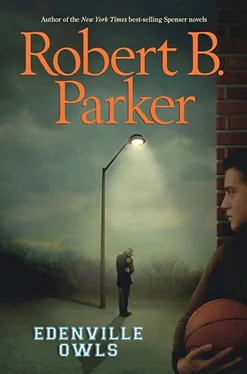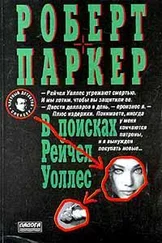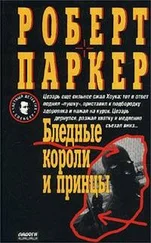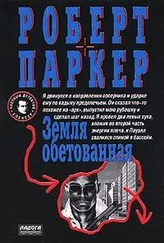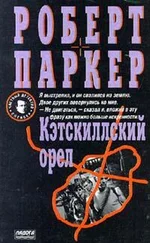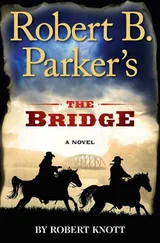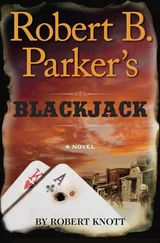“If I do, you guys can save me,” I said.
“Have to,” Nick said. “Joanie would kill me if I didn’t help you.”
“Hell,” Russell said. “She’d kill us all.”
“I’ll let you know,” I said.
Nick grinned.
“Owl patrol at the ready,” he said.
It was a mild winter. No snow. The temperatures were usually above freezing. The sun was usually out. It was out on Sunday morning when I got on my bike and road up County Road to Searsville.
Number 132 was a small white one-story building near the road with a few cars parked on the gravel parking lot in front. It looked like some kind of meeting hall. In back there was a house trailer parked next to the hall. The trailer was one of those smooth rounded silver ones, and it looked new. There was a wooden sign by the road that said “Church of America” across the top, and underneath that, “The Rev. Oswald Tupper. Service at 11, Youth Group at 1.” It was ten past eleven. I leaned my bike on the sign. My stomach was tight, and I felt like I was out of breath.
I looked at everything for a minute. Then I took in as much air as I could and went into the hall. It was small, with folding chairs to sit on. There were maybe fifteen or twenty people sitting down, and up front, there he was. He had on a dark double-breasted suit and a red tie. He was standing at some kind of lecture stand and behind him on the wall was a large American flag with a big crucifix on it.
I realized I was still holding in the breath I had taken. I let it out as quietly as I could and went and sat on an empty chair in the back. I knew he saw me come in. He had looked right at me. But he didn’t seem to recognize me. I was, after all, just some kid he’d chased away from his car once. He smiled when I sat down.
“Latecomers are welcome too,” he said.
His voice was very round and official-sounding in the church. It didn’t have that scary sound it had had when he told me to get away from his car. I looked down at my knees as if I were praying.
“As I was telling the others,” Tupper said with a smile, “‘we are face-to-face with both disaster and possibility. The disaster is that the war is over, and the white race lost. Franklin Delano Jewsavelt and the kike conspiracy managed to defeat that struggle for racial purity. But therein lies the possibility. The war is over, all is in flux, and the energies of white America can be focused on the preservation, at least here, in this free country, of the purity of the white race.”
Jewsavelt? Kike? What in God’s name was he talking about?
“The Communists and the Jews,” Tupper went on, “would have us coupling with niggers, and raising a generation of baboons who will do what the Jew commissars tell them.”
Niggers? Baboons? What in hell was a Jew commissar?
“That is why,” Tupper said, “it’s so heartening to see young men here. Young men who have not yet been corrupted, young men who are proud to be American and proud to be white. Young men in whom our future rests, if they will take the opportunity that lies before us. If they will stay true to what they are and what they came from.”
I looked around the room. The men were nodding agreement with everything Tupper said. As he continued, I nodded when the men did. There were three or four other kids in the room, sitting beside their fathers. They nodded too, when the adults did.
Tupper went on about this stuff for a long time. It wasn’t like he used words I never heard. Lots of people said nigger and kike in Edenville. I was used to it, although it always made me feel uncomfortable. But you never heard a minister say it in a church, like it was religious.
After the sermon we waited while Tupper went to the front of the church to greet everybody on the way out.
“This your first time here, son?” he said to me as I came out.
“Yes, sir.”
“What’s your name son?”
“Murphy, sir, Robert Murphy.”
“A fine old Irish name,” he said with a fake Irish accent. “Would you be Catholic?”
“I guess so,” I said.
“Well,” he said. “No matter. I hope you’ll be joining us in youth group this afternoon.”
“I have to go home, sir,” I said. “But I hope I can come next week.”
“I hope so, Robert,” Tupper said. “You’re just the kind of lad I’m looking for.”
I said, “Yes, sir,” and moved on.
As I pedaled home along County Road, I kept glancing back to make sure no one was following me.
“My uncle John was in the war,” Joanie said. “My mother’s brother. He saw one of those Jewish prison camps.”
We were on the bandstand. It was sunny, and pleasant for winter. Joanie was sitting in the sun on one of the bandstand railings. I was walking around the perimeter of the bandstand as we talked.
“Concentration camps,” I said. “What did he say about them?”
“He wouldn’t talk about them,” Joanie said. “Just that they were awful.”
“I think they killed Jews there,” I said.
“That’s what Uncle John says.”
There were a lot of veterans around Edenville. Guys who’d been on ships. Guys who’d been waist gunners in B-17s. Guys who’d been in North Africa. Guys who’d been in Italy and Europe and the Pacific. Some of the guys had been wounded. Some of the guys who’d been in the Pacific were still kind of yellowish from some jungle disease they’d got. Philly DeCosta was deaf in one ear from being an artillery gunner. Most of them wore some part of their old uniforms around. Leather flight jackets, pea coats, and a lot of old field jackets with the insignia still on them. I still knew most of the patches the way I knew all of the airplanes. Screaming Eagle for the 101st Airborne; blue and white stripes for the 3rd Division. Corporal’s stripes. Captain’s bars. I always wanted a field jacket, a real one, worn by a real soldier. But the war was over, and I had missed my chance. Unless there was another one. I felt sort of guilty, and I never said it, but I hoped there’d be another one.
“Do you suppose this man is a Nazi?” Joanie said.
“Hard to figure a Nazi preacher,” I said.
“Maybe he isn’t really a preacher,” Joanie said.
“He says he is. He gave a sermon. People come to listen.”
“Still doesn’t make him a real minister,” she said.
“No.”
“Are you going to go back for the youth meeting?”
“I don’t know,” I said.
“Are you afraid?”
“No.”
“I would be,” Joanie said. “He sounds awful.”
I shrugged.
“Remember we promised never to lie to each other,” Joanie said.
“Maybe I’m a little scared,” I admitted.
She smiled.
“Maybe,” she said.
“But I don’t know what good it would do me to go,” I said.
“Because you know all you need to know about him?”
“I guess.”
“I agree,” Joanie said. “What we need is to know what’s going on with Miss Delaney.”
“Yeah.”
“Do you have a plan?”
“I’m figuring,” I said.
“If you go to that man’s youth meeting ever,” Joanie said, “I could go with you.”
Wow!
“I think it’s only for boys,” I said.
“Isn’t it always,” Joanie said.
Even the small movie theaters in second-level cities were impressive. All of them had big velvet curtains on either side of the big screen. There were gilt-trimmed loge boxes on either side of the theater, just like real theaters where they put on plays in New York. Usually there were two movies, a newsreel, maybe a cartoon, previews of coming attractions, and sometimes a short subject, Robert Benchley or some other person like that... Every week during the war, on Saturday afternoons, unless we were playing basketball, we went to see double-feature westerns at The Art Theater on Purchase Street in New Bedford. These weren’t westerns like Duel in the Sun with Gregory Peck, or My Darling Clementine with Henry Fonda. They were more grown-up movies in which we had little interest. In fact, often we hadn’t even heard of them. If we did see them, we thought they were kind of slow. Instead we saw Tom Mix and Rocky Lane; Wild Bill Elliott and Bob Steele; Buck Jones, Sunset Carson, Ken Maynard, Johnny Mack Brown, Hoot Gibson, and Randolph Scott... We saw every Tarzan movie starring Johnny Weismuller. We would have died to be Boy. We were saddened as Johnny Weismuller got heavier and heavier. We never doubted that the movies were shot on location. The whole question of sex bothered us a little. If Jane and Tarzan were married, who married them? If they weren’t married, then what were they doing living together out there in the jungle? Someone told me that they had actually gotten married at the end of one of the books, but I never found the place, and for us, Tarzan was a figure of the movies... We also went to any Boston Blackie movie we could find. Blackie was played by Chester Morris, who was also on the radio: “Enemy to those who make him an enemy. Friend to those who have no friend.” We watched Tom Conway as The Falcon and anything Bing Crosby was in: Going My Way, The Bells of St Mary’s, and the Road pictures he made with Bob Hope and Dorothy Lamour, which all of us thought were hilarious. Even with these movies we were not at all sure it was not shot in Rio, or Singapore, or wherever. It was years, even after seeing many real cities, before I could imagine a city as looking different than the back lot city of noir films, and B movie detective stories. It was like movies were more real than the life I was actually living.
Читать дальше
